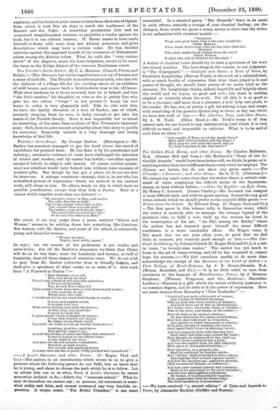The Golden Hind, Menai, and, other Poems. By Charles Robinson,
M.A. (George Bell and Sons.)—Mr. Robinson's "Story of the In- vincible Armada "would have been better told, we think, in prose, or in anythingrather than the indifferent blank-verse which he employs. The rhymes are better, but do not show any great merit.—The Crusader a Romaunt ; and other Poems. By G. N. C. (Newman.)— We cannot say much more than that the writer shows a certain com- mand of verse, employing the difficult metre of the Spenserian stanza, at least without failure.—John, the Baptist : an Epic 130874. By Henry C. Leonard. (James Clarke.)—Mr. Leonard has essayed a most difficult task, and without great success. It must be very good verse, indeed, which we should prefer to the majestic Bible prose.— Echoes from the Orient. By Edward King. (C. Kagan Paul and Co.) —The first poem in this volume tells, in Spenserian verse, which the writer is scarcely able to manage, the strange legend of the architect who, to fulfil a vow, built up the woman he loved in the masterpiece of his art. "An Idyl among the Rocks," where the author has not imposed upon himself the same difficult conditions, is a more successful effort. Mr. King's verse is like much that we see year after year, so good that we find little to censure, yet scarcely good enough to live.—The Car.- dinal Archbishop, by Colonel Colomb (C. Kegan Paul and Co.), is a tale in verse, "in twenty-nine cantos." The author has yet much to learn in the art of verse-writing, and till he has acquired it, cannot hope for success.—We feel ourselves unable to do more than acknowledge the receipt of the Romance of the Youth of Arthur : a First Trilogy of Music-Dramas, by J. S. Stuart-Glennie, M.A. (Mexon, Saunders, and Co.)—It is no little relief to turn from sentiment to the humour of Miscellaneous Poems, by J. Brunton Stephens. (Watson, Ferguson, and Co., Brisbane ; Macmillan. London.)—Humour is a gift which the writer evidently possesses in no common degree, and he adds to it the power of expression. Here are some stanzas from Macaulay's "New Zealander"
Could tell you quite a fairy-tale of science, And wonders in Political Economy, That set your time-worn statutes at defiance, And hold them out of date as Deuteronomy : The dark-y, boss; the trashy white, a 'brudder;' Man at the prow, and woman at the rudder ;— How all shall go by natural selection ; No man allowed to live unless good-looking; How love shall vent itself in vivisection, And charms be rated subsequent to cooking ; How girls, instead of knitting sofa-covers, Shall spend their leisure in tattooing lovers ; And how magnetic belts with dazzling hues Shall draw unwilling arms around the waist ; How damsels, to enhance their lips, shall use Odyllic force condensed into a paste; And woo the bashful from his slow simplicity With cakes of desiccated electricity ;— How education, as a general role, Shall be conducted by familiar spirits ; How ' circles ' shall be formed in every school, And rappings shall reward superior merits ; And how the spectroscope, applied to spectres, Shall re-enact all history, on reflectors ;— And how your vaunted patents and inventions
Shall be for play-Map to the great hereafter ;
And all your philosophical pretensions Be themes of inextinguishable laughter ; Your engineering form for future times The droll machinery of pantomimes."
—We have received "a second edition" of Tales and Legends in Verse, by Alexander Buckler (Griffith and Farran).


































 Previous page
Previous page